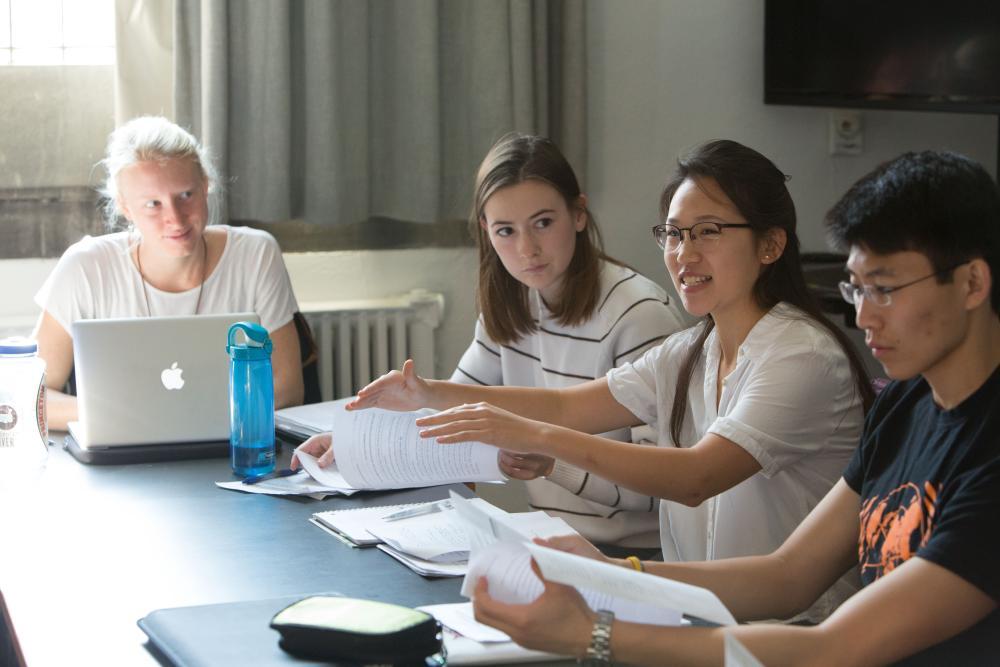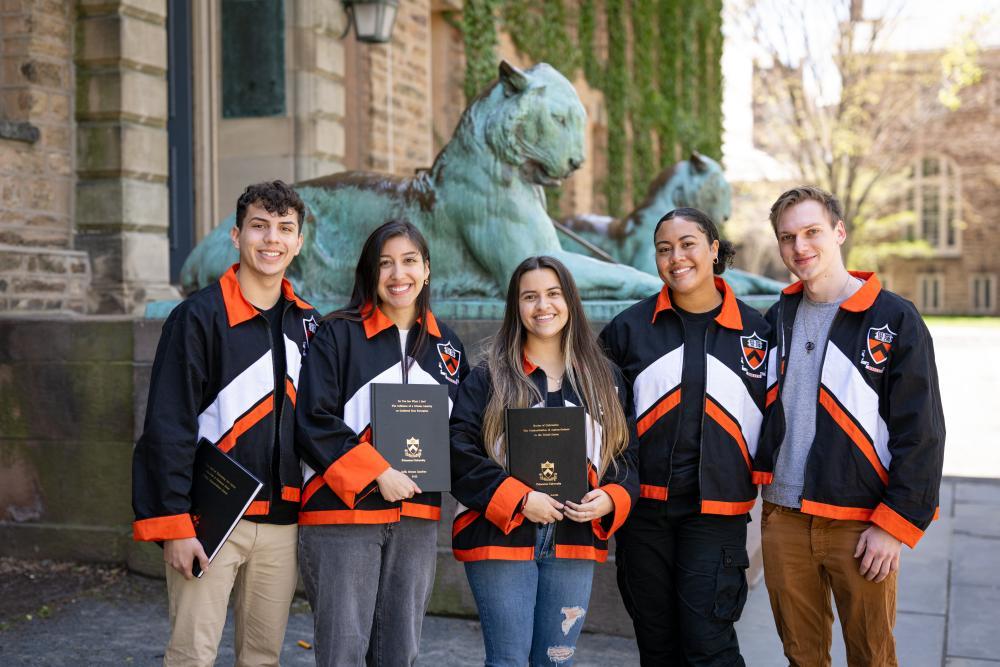Videos do not contain audio.
Our curriculum encourages students to explore many disciplines and to develop a deep understanding in one area of concentration. Students apply to Princeton University, not to individual departments, programs or schools. Once enrolled, students may pursue either the Bachelor of Arts (A.B.) or the Bachelor of Science in Engineering (B.S.E.) degree. Within these degree programs, students can choose from among 37 majors (computer science offers both A.B. and B.S.E.) and over 50 interdepartmental minors and certificate programs. The A.B. includes concentrations in the Princeton School of Public and International Affairs and the School of Architecture.
During their first two years at Princeton, students in the A.B. program are encouraged to explore the curriculum. They are required to complete one or two courses in each of seven general areas: epistemology and cognition, ethical thought and moral values, historical analysis, literature and the arts, quantitative reasoning, laboratory science and technology, and social analysis. All A.B. students must demonstrate proficiency in English composition through a one-semester writing seminar. They also must become proficient in another language. Princeton offers courses in more than 18 different languages. In the spring of their sophomore year, students choose a major to pursue in their junior and senior years.
The B.S.E. is granted by the School of Engineering and Applied Science. Approximately 25% of each class is enrolled in the B.S.E. program. At the end of their first year, engineers choose to concentrate in one of the six engineering departments.
In their first two years, students in the engineering program fulfill requirements in mathematics, physics, chemistry and computer science, as well as taking a freshman writing seminar. Engineering at Princeton is taught within the context of a liberal arts approach to education. Engineering students are required to complete at least seven Princeton courses in the humanities and social sciences. Because engineering disciplines evolve and change, much of the teaching of engineering and applied science at Princeton is directed toward mastering fundamental principles: the why and not just the how to.
Whether they are in the A.B. program or the B.S.E. program, during their junior and senior years all students conduct independent research in their home department, culminating in the senior thesis, working one-on-one with a faculty mentor. Some students conduct their research in the library or the lab. Others travel to do field research or undertake a creative project such as a novel or a series of paintings.
The freshman seminars and the precept system are two defining components of a Princeton education. Limited to 15 students and led by some of our most distinguished professors, approximately 70 freshman seminars are offered yearly, each hosted in one of our six residential colleges.
Most lecture courses at Princeton include a precept, a small discussion group that meets weekly to further explore the topics from a course’s lectures and readings. In precepts, students are encouraged to voice their views and challenge each other to look at issues and ideas from new perspectives.
The student to faculty ratio at Princeton is 5:1. From freshman seminars to senior theses, faculty are deeply engaged in undergraduate teaching, and they are readily available to students outside the classroom for individual conferences and informal conversations.

The Senior Thesis
At Princeton, every senior writes a thesis or, in the case of some engineering departments, undertakes a substantial independent project.
Learn More
The Senior Thesis
At Princeton, every senior writes a thesis or, in the case of some engineering departments, undertakes a substantial independent project.
Learn More- Grady Trexler '24
Read MoreDegrees
Students apply to Princeton University, not to individual departments, programs or schools. Once enrolled, they can choose from 37 concentrations.
New & Noteworthy
Environmental Research at Princeton Is Addressing the World’s Challenges
Environmental challenges have galvanized activity across Princeton’s campus in recent years like few other issues in our history. From physical, biological and applied sciences to art, architecture, psychology, policy and more, research groups across the University are tackling some of the toughest problems facing humanity with the fullest range of toolkits.
Princeton Research Day Returns
In what Dean for Research Pablo Debenedetti called a “joyous return” to a live celebration, 2022 Princeton Research Day brought themes of innovation and curiosity-driven research that were on full, in-person display for the first time in three years.
BLOG: “Independent Work in Its Full Glory”
Blogger Richard Ma explains how A.B. students will write at least one junior paper and a full senior thesis, while B.S.E. students typically have a senior thesis and the opportunity to conduct junior independent work as well.
Seven Princeton Faculty Elected to American Academy of Arts and Sciences
Princeton faculty members David Bell, Nancy Bermeo, Jonathan Cohen, Bo Honoré, Sabine Kastner, Yiyun Li and Daniel Rubenstein have been elected to the American Academy of Arts and Sciences.
BLOG: “Exploring the Visual Arts as an Engineer”
Blogger Amélie Lemay explains how Princeton's liberal arts education prepares you to be a creative and dynamic problem-solver no matter your concentration.
Princeton Research Is Pursuing a Sustainable Future for New Jersey
When it comes to understanding and protecting the environment, New Jersey provides fertile ground for Princeton University researchers. The state’s four geological regions and its mix of urban, rural and suburban communities allow Princeton faculty, staff and students to develop environmental and climate solutions on their home turf that address an array of global concerns.
BLOG: “All About Reading Period”
Blogger Amélie Lemay breaks down reading period at Princeton, a time for students to write their final papers and prepare for exams.






